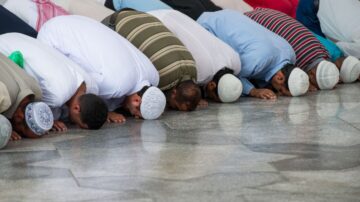Another blessed month of Ramadan is upon the world, by the grace of God. While the days are famous for the fasts in which Muslims abstain from food, drink (yes, even water), and intimate relations, the nights are dedicated to worship.
While the current pandemic has changed the ways in which we celebrate special events on the calendar, the blessings up for grabs on Ramadan nights have not diminished in any way. Let’s take a look at a Muslim’s schedule after a daylong fast.
Breaking the Fast at Sunset
The first event of the evening is often a very anticipated one. When the sunset graces the horizon, Muslims can officially end their fast for the day. This is often done with a date and water to follow the practice of the Prophet Muhammad (blessings and peace be upon him). Many families will also enjoy traditional dishes that are saved for Ramadan iftars, the meal that is eaten at the end of the fasting day.
Currently, the month of Ramadan falls in the spring from April to May. While the fasts are long, Muslims have experienced longer days in previous years when the holy month fell in June and July. Either way, you will be hard-pressed to find a fasting Muslim who does not know what time sunset is on any particular day of Ramadan.
Praying the Maghrib Prayer
After breaking the fast, Muslims pray the fourth prayer of the day called Maghrib. The time for Maghrib comes in at sunset. Some families will break their fast with a date, pray Maghrib, and come back to the table for dinner. Others will eat their whole meal before the prayer and take time to relax after they pray. The schedule varies slightly from family to family, but the prayer must be performed within its dedicated time that usually lasts for roughly an hour and a half for Maghrib.
Preparing for the Isha Prayer
After eating their meals, Muslims begin preparation for the final obligatory prayer of the day called Isha. This entails brushing the teeth (the smell of garlic and onion emitting from the mouth is frowned upon), refreshing the ablution, and getting dressed in prayer-appropriate clothing before heading to the mosque (or even a dedicated space within the home). This Isha prayer is a requirement throughout the year. During Ramadan however, there is an extra effort made on the part of Muslims to perform it in congregation at the mosque.
Performing Taraweeh
After the obligatory Isha prayer, there is an extra prayer special to the month of Ramadan called Taraweeh. The units of prayer are often much longer than usual, as congregations make an effort to complete the entire recitation of the Quran over the span of the month. Due to the pandemic, in 2020, most people had to perform the Taraweeh prayers at home due to mosque closings. This year, many mosques are open but with limited capacity. The good thing is, the prayer can be done at home (many caretakers of young children opted for this option even before COVID-19) and the blessings can still be obtained even if an individual does not have the entire Quran memorized.
Rest
The Taraweeh prayer is sort of like a marathon and can take up to two hours to complete, but the winning feeling upon its completion is so worth it. After this prayer, many Muslims will opt to take some rest before they need to wake up in preparation for the next day’s fast. In the warmer months, the nights are short, and time to rest is very sparse. However, a Muslim may tell you there is an immense amount of blessing that rains down in the month of Ramadan. Because of that, the feats of fasting, long prayers, and additional worship are all manageable, all while still upholding the daily and worldly responsibilities of work or school.
Additional Worship
After a brief rest, many Muslims will try to wake in the final third of the night in order to take advantage of Tahajjud prayer. This is a very special moment that happens every night. Muslims believe that God is closest to the servant at this time. Allah’s Messenger (blessings and peace be upon him) said, “Our Lord, the Blessed, the Superior, comes every night down on the nearest Heaven to us when the last third of the night remains, saying: ‘Is there anyone to invoke Me, so that I may respond to invocation? Is there anyone to ask Me, so that I may grant him his request? Is there anyone seeking My forgiveness, so that I may forgive him?’” (Bukhari).
Because of this, it would be advisable to spend those moments in prayer and supplication to ask God to fulfill any and every need, especially in the month of Ramadan.
Pre-Dawn Meal
Before the time of the new day’s first prayer (Fajr) begins in the morning, Muslims are advised to take part in a pre-dawn meal called suhoor. This meal is said to have much blessing in it, and it is a practice of the Prophet Muhammad (blessings and peace be upon him). A companion named Anas (God be pleased with him) reported Allah’s Messenger (blessings and peace be upon him) as saying: “Take meal a little before dawn, for there is a blessing in taking meal at that time” (Muslim).
In addition to spiritual benefits, this meal helps to energize a person for the fasting day ahead. Muslims will remind each other to consume a nutritious, hearty meal, and be sure to hydrate. Remember, not even water is allowed during the fasting hours in Ramadan! Once dawn hits, the fasting day begins, and another Ramadan night has officially passed.
By Habeeba Husain

